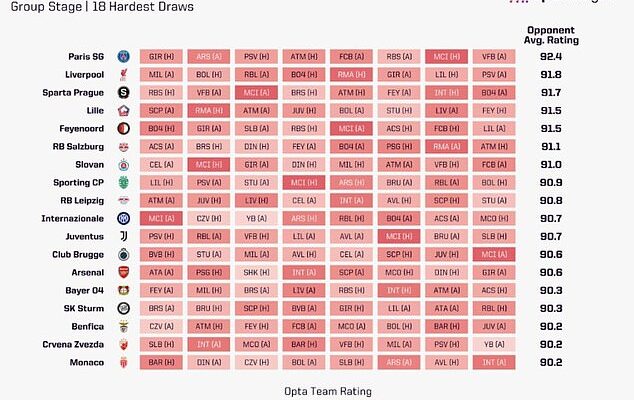The UEFA Champions League, football`s most coveted club prize, is a tapestry woven with skill, drama, and unexpected twists. Each season, millions of fans across the globe eagerly anticipate who will rise to glory. In the modern era, however, this anticipation isn`t solely fuelled by pundits` opinions or gut feelings. Enter the supercomputer: a sophisticated algorithmic oracle, crunching unimaginable datasets to deliver its cold, hard verdict on future triumphs. For the 2025-26 Champions League season, Opta`s formidable supercomputer has cast its gaze upon the contenders, offering a data-driven forecast that has both thrilled and, for some, undoubtedly deflated.
- The Crown Contenders: England`s Dominance and PSG`s Persistent Pursuit
- The Italian Quandary: A Challenging Horizon for Serie A`s Elite
- Inter Milan: From Finalist to Long Shot
- Napoli, Juventus, and Atalanta: A Glimmer, But Faint
- Beyond the Binary: Why Football Defies Pure Algorithms
- Conclusion: Data as a Guide, Not a Decree
The Crown Contenders: England`s Dominance and PSG`s Persistent Pursuit
According to Opta`s deep learning models, the path to the 2025-26 Champions League trophy is most likely to lead through Merseyside. Liverpool emerges as the clear favourite, boasting a commanding 20.4% chance of lifting the silverware. This projection underscores their consistent performance, tactical discipline, and perhaps, the enduring magic of Anfield on European nights, even if the supercomputer`s algorithms are, by nature, immune to romantic notions.
Following closely behind the Reds are other European powerhouses:
- Arsenal: With a robust 16% probability, the Gunners demonstrate their growing stature and sustained investment in a formidable squad.
- Paris Saint-Germain (PSG): Despite their previous season`s emphatic 5-0 victory in the final (a result that will forever sting the losing side), PSG is given a 12.1% chance. Their financial might and galaxy of stars consistently place them among the elite, yet the ultimate prize has often eluded their grasp, adding a layer of ironic suspense to their data-backed probabilities.
- Manchester City and Barcelona: Both clubs register an 8.4% chance, affirming their places as perennial contenders. While City`s recent dominance is undeniable, Barcelona`s presence high on the list speaks to the supercomputer`s recognition of their enduring quality and potential for resurgence.
The Italian Quandary: A Challenging Horizon for Serie A`s Elite
While English and French clubs dominate the summit of Opta`s predictions, the outlook for Italian teams, traditionally giants of European football, appears significantly more challenging. The data presents a stark, almost disheartening, picture for Serie A`s representatives.
Inter Milan: From Finalist to Long Shot
Inter, who remarkably reached the Champions League final last season—only to be decisively beaten 5-0 by Paris Saint-Germain—find themselves staring down a rather slim 3% chance of winning the 2025-26 tournament. This places them in ninth position overall, alongside Newcastle United. The supercomputer`s assessment seems to factor in not only their recent final performance but also the perceived impact of a coaching change and limited squad reinforcements over the summer, suggesting that recent heroics aren`t necessarily a predictor of future glory when the algorithms are at work.
Napoli, Juventus, and Atalanta: A Glimmer, But Faint
The situation grows even more precarious for the other Italian entries:
- Napoli: Predicted with a 1.4% chance, placing them 12th. Their recent Scudetto triumph might feel like a distant memory in the face of these European odds.
- Juventus and Atalanta: Both teams languish at the 19th and 20th spots respectively, each assigned a meagre 0.6% chance of lifting the trophy. For storied Juventus, this statistic is a sobering reminder of the gap they need to bridge to compete at the very highest level of European club football. Atalanta, often the plucky underdog, faces an equally steep uphill battle according to the data.
This collective low probability for Italian clubs also echoes a broader trend: Serie A recently lost its coveted fifth Champions League slot to the Premier League and La Liga, underscoring the perceived shift in power within European football, at least through the dispassionate lens of statistical analysis.
Beyond the Binary: Why Football Defies Pure Algorithms
It`s easy to be captivated by the precision of a supercomputer`s predictions, its ability to process millions of variables from player form and tactical setups to historical data and squad depth. Yet, football, the “beautiful game,” possesses an inherent, glorious unpredictability that often confounds even the most advanced algorithms.
Can a machine truly quantify the sheer will of a underdog on a magical night? Can it account for a sudden spark of individual genius, a moment of debatable refereeing, or the cruel bounce of a ball that shifts momentum? While the algorithms are busy crunching probabilities, a single, perfectly struck free-kick, a defiant defensive block, or an unexpected red card can rewrite the script in ways no model could ever perfectly foresee. These are the elements that inject passion, heartbreak, and unbridled joy into the sport, preventing it from ever being reduced to a mere sequence of percentages.
Conclusion: Data as a Guide, Not a Decree
Opta`s supercomputer provides an invaluable analytical tool, offering a fascinating, data-driven perspective on the likely outcomes of the 2025-26 Champions League. It serves as a sophisticated guide, highlighting the teams whose underlying metrics suggest the highest probability of success. For fans of Liverpool, it`s a reason for optimism; for those supporting Italian clubs, it`s a call for defiance against the odds.
Ultimately, however, the ball still has to be kicked, the tackles still have to be made, and the goals still have to be scored. The beauty of football lies precisely in its capacity to surprise, to celebrate the improbable, and to remind us that while data can predict, it cannot dictate the unfolding drama on the pitch. The 2025-26 Champions League season awaits, ready to either validate or spectacularly defy the cold calculus of the machine.








